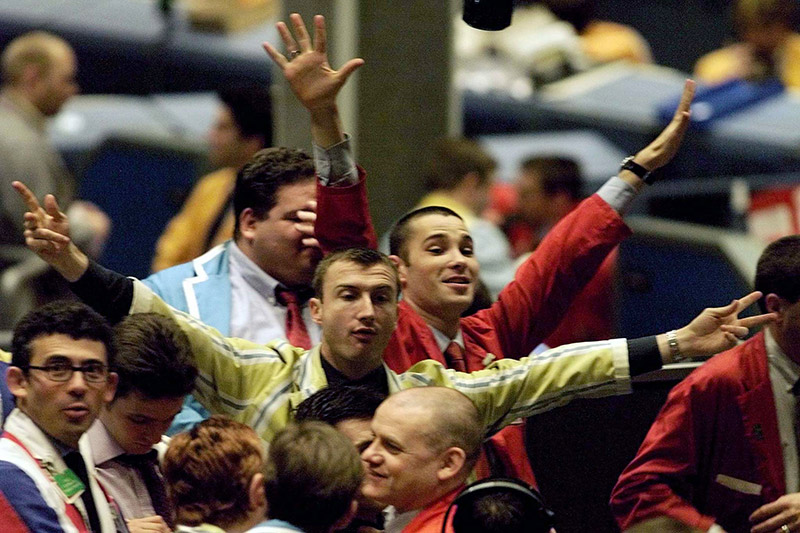Investing.com - European stock markets were sharply lower on Tuesday, as global growth concerns continued to weigh on investor confidence after Friday’s U.S. nonfarm employment data and a trade balance report from China earlier in the day.
During European morning trade, the EURO STOXX 50 tumbled 1.42%, France’s CAC 40 plummeted 1.53%, while Germany’s DAX 30 declined 1.18%.
Stocks came under pressure after official data showed earlier that China posted a trade surplus of USD5.35 billion last month, as imports grew just 5.3% after increasing by 39.6% in February.
Meanwhile, weaker-than-expected nonfarm employment data from the U.S. on Friday revived expectations that the Federal Reserve may conduct a fresh round of quantitative easing and added to uncertainty over the global economic recovery.
At a conference earlier in the day, Fed Chairman Ben Bernanke said the U.S. economy “is still far from having fully recovered” from the financial crisis.
Financial stocks were broadly lower, led by Dutch lender ING Group, down 3.96%. France’s BNP Paribas and Societe Generale plunged 3.48% and 3.54% respectively, while German lenders Deutsche Bank and Commerzbank tumbled 1.91% and 3.31%.
Spain’s Banco Santander and BBVA also saw shares sink 2.77% and 2.20% respectively as Santander’s Chief Executive Officer and other banking executives were to participate in a conference about the financial industry in Madrid later in the day.
Separately, Spanish Prime Minister Mariano Rajoy stepped up efforts on Monday to reassure investors he can bring the country’s deficit under control.
Meanwhile, STMicroelectronics dropped 3.82% after the chipmaker cut its first-quarter gross-margin forecast. The company also said an arbitration panel ordered it to pay about USD59 million to NXP Semiconductors.
In London, FTSE 100 declined 1.02%, as U.K. lenders tracked their European counterparts lower while industry data showed that U.K. house prices fell less-than-expected in March.
Shares in Barclays plunged 3.49% and the Royal Bank of Scotland tumbled 1.94%, while Lloyds Banking and HSBC Holdings plummeted 1.62% and 1.07%.
Mining giants Rio Tinto and Bhp Billiton also added to losses, with shares sinking 2.58% and 1.81%, as did copper producers Xstrata and Kazakhmys, down 2.43% and 2.21%.
Vedanta Resources retreated 3.16% as the company reported that fourth-quarter iron-ore sales fell to 5.2 million tons from 6.4 million tons a year earlier because of a continued mining ban in Karnataka, India.
On the upside, Randgold Resources surged 8.83% after the leader of Mali’s military junta, Amadou Sanogo, said that he will honor an agreement to hand over power to a temporary government.
Randgold welcomed the political settlement in a statement earlier Tuesday and said its production guidance for 2012 remained unchanged.
In the U.S., equity markets pointed to a higher open. The Dow Jones Industrial Average futures pointed to a rise of 0.13%, S&P 500 futures signaled a 0.11% increase, while the Nasdaq 100 futures indicated a 0.18% gain.
Also Tuesday, official data showed that French industrial production rose more-than-expected in February, ticking up 0.3% after a 0.2% increase the previous month. Analysts had expected industrial production to rise 0.2% in February.
Later in the day, the euro zone was to publish data on investor confidence.
During European morning trade, the EURO STOXX 50 tumbled 1.42%, France’s CAC 40 plummeted 1.53%, while Germany’s DAX 30 declined 1.18%.
Stocks came under pressure after official data showed earlier that China posted a trade surplus of USD5.35 billion last month, as imports grew just 5.3% after increasing by 39.6% in February.
Meanwhile, weaker-than-expected nonfarm employment data from the U.S. on Friday revived expectations that the Federal Reserve may conduct a fresh round of quantitative easing and added to uncertainty over the global economic recovery.
At a conference earlier in the day, Fed Chairman Ben Bernanke said the U.S. economy “is still far from having fully recovered” from the financial crisis.
Financial stocks were broadly lower, led by Dutch lender ING Group, down 3.96%. France’s BNP Paribas and Societe Generale plunged 3.48% and 3.54% respectively, while German lenders Deutsche Bank and Commerzbank tumbled 1.91% and 3.31%.
Spain’s Banco Santander and BBVA also saw shares sink 2.77% and 2.20% respectively as Santander’s Chief Executive Officer and other banking executives were to participate in a conference about the financial industry in Madrid later in the day.
Separately, Spanish Prime Minister Mariano Rajoy stepped up efforts on Monday to reassure investors he can bring the country’s deficit under control.
Meanwhile, STMicroelectronics dropped 3.82% after the chipmaker cut its first-quarter gross-margin forecast. The company also said an arbitration panel ordered it to pay about USD59 million to NXP Semiconductors.
In London, FTSE 100 declined 1.02%, as U.K. lenders tracked their European counterparts lower while industry data showed that U.K. house prices fell less-than-expected in March.
Shares in Barclays plunged 3.49% and the Royal Bank of Scotland tumbled 1.94%, while Lloyds Banking and HSBC Holdings plummeted 1.62% and 1.07%.
Mining giants Rio Tinto and Bhp Billiton also added to losses, with shares sinking 2.58% and 1.81%, as did copper producers Xstrata and Kazakhmys, down 2.43% and 2.21%.
Vedanta Resources retreated 3.16% as the company reported that fourth-quarter iron-ore sales fell to 5.2 million tons from 6.4 million tons a year earlier because of a continued mining ban in Karnataka, India.
On the upside, Randgold Resources surged 8.83% after the leader of Mali’s military junta, Amadou Sanogo, said that he will honor an agreement to hand over power to a temporary government.
Randgold welcomed the political settlement in a statement earlier Tuesday and said its production guidance for 2012 remained unchanged.
In the U.S., equity markets pointed to a higher open. The Dow Jones Industrial Average futures pointed to a rise of 0.13%, S&P 500 futures signaled a 0.11% increase, while the Nasdaq 100 futures indicated a 0.18% gain.
Also Tuesday, official data showed that French industrial production rose more-than-expected in February, ticking up 0.3% after a 0.2% increase the previous month. Analysts had expected industrial production to rise 0.2% in February.
Later in the day, the euro zone was to publish data on investor confidence.
